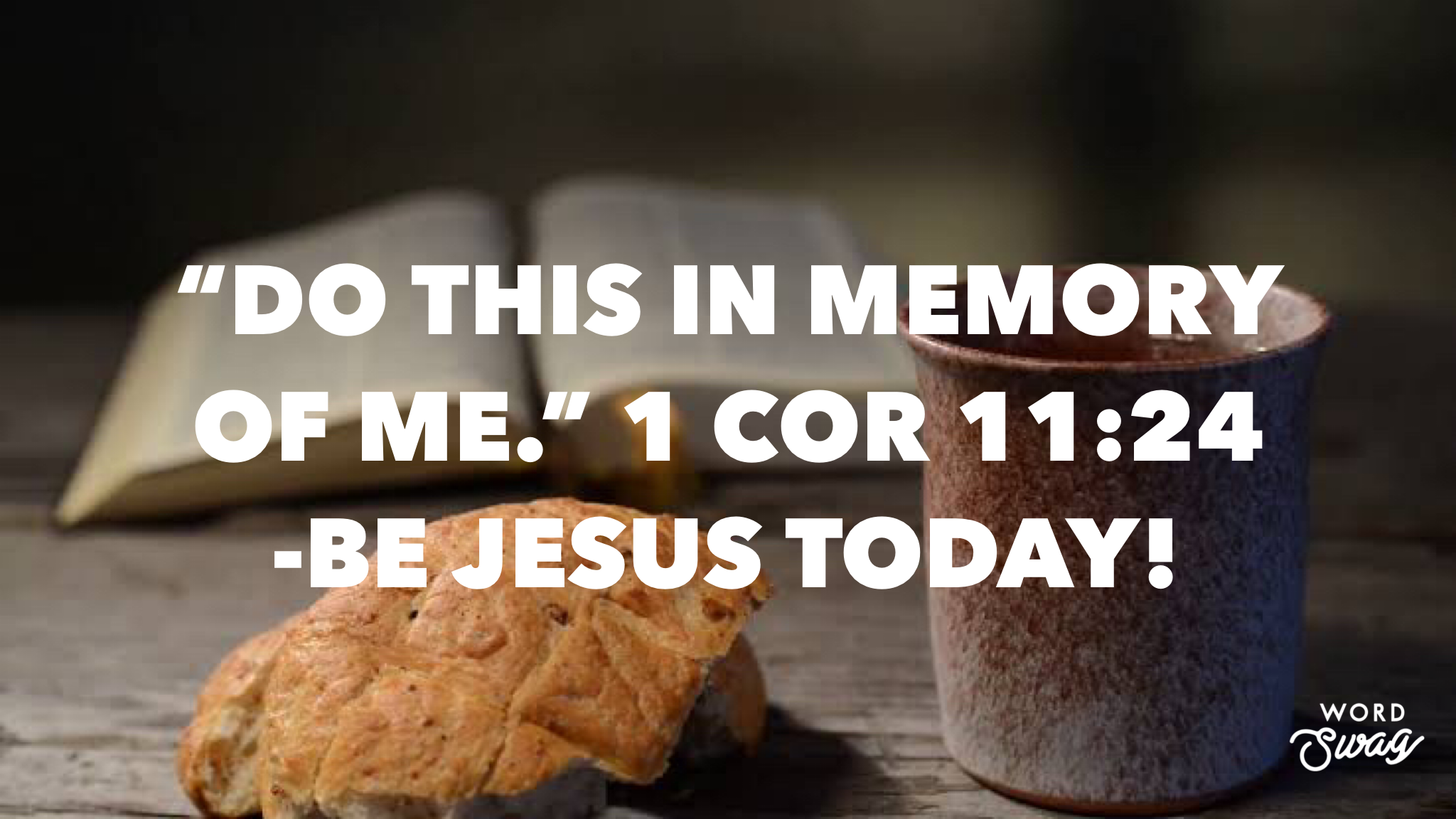June 23, 2019 – Sunday of the Solemnity of the Most Holy Body and Blood of Christ
GN 14:18-20
In those days, Melchizedek, king of Salem, brought out bread and wine,
and being a priest of God Most High,
he blessed Abram with these words:
“Blessed be Abram by God Most High,
the creator of heaven and earth;
and blessed be God Most High,
who delivered your foes into your hand.”
Then Abram gave him a tenth of everything.PS 110:1, 2, 3, 4
R.(4b) You are a priest forever, in the line of Melchizedek.The LORD said to my Lord: “Sit at my right hand
till I make your enemies your footstool.”The scepter of your power the LORD will stretch forth from Zion:
“Rule in the midst of your enemies.”“Yours is princely power in the day of your birth, in holy splendor;
before the daystar, like the dew, I have begotten you.”The LORD has sworn, and he will not repent:
“You are a priest forever, according to the order of Melchizedek.”1 COR 11:23-26
Brothers and sisters:
I received from the Lord what I also handed on to you,
that the Lord Jesus, on the night he was handed over,
took bread, and, after he had given thanks,
broke it and said, “This is my body that is for you.
Do this in remembrance of me.”
In the same way also the cup, after supper, saying,
“This cup is the new covenant in my blood.
Do this, as often as you drink it, in remembrance of me.”
For as often as you eat this bread and drink the cup,
you proclaim the death of the Lord until he comes.LK 9:11B-17
Jesus spoke to the crowds about the kingdom of God,
and he healed those who needed to be cured.
As the day was drawing to a close,
the Twelve approached him and said,
“Dismiss the crowd
so that they can go to the surrounding villages and farms
and find lodging and provisions;
for we are in a deserted place here.”
He said to them, “Give them some food yourselves.”
They replied, “Five loaves and two fish are all we have,
unless we ourselves go and buy food for all these people.”
Now the men there numbered about five thousand.
Then he said to his disciples,
“Have them sit down in groups of about fifty.”
They did so and made them all sit down.
Then taking the five loaves and the two fish,
and looking up to heaven,
he said the blessing over them, broke them,
and gave them to the disciples to set before the crowd.
They all ate and were satisfied.
And when the leftover fragments were picked up,
they filled twelve wicker baskets.The Gospel of the Lord.
During reunions of families and friends, we usually recall old stories and past events where we have been together. We cherish those moments as we remember important events. Usually, remembering of the past is done over a shared meal.
Mostly, it is around the table that we gather to remember our story. During those moments of remembering, we become more alive and present with one another. Thus, during reunions, friendships and family relationships become stronger and more treasured.
But what is the reason for these gatherings? What compel us to gather and celebrate family relationships and friendships? Is it not because that we are so grateful to God and grateful of the presence of one another that we gather together? Yes, reunions and other family events are organized because we are thankful. These occasions derive from being grateful.
What we are doing now in this Eucharistic Celebration is a kind of a reunion, but a sacred reunion. And most of all, what we do is an act of thanksgiving. In fact, the word Eucharist means Thanksgiving. As individuals and as community, we recognize how grateful we are to God because of the many blessings that we have received, from our life to the offer of salvation and freedom.
It is also a remembering of the past but making it alive today with us. What we do in this mass, happened in the past, but we do it again because Jesus told us to, “Do this in memory of me!” That is why, our readings today brought us back into that beautiful memory of God’s action within human history.

In the first reading, the Book of Genesis recalls of the victory of Abram against the enemies who kidnapped his nephew Lot. Abram recovered the possessions and his nephew against his enemies. At his return, Melchizedek, the king of Salem, which also means the king of peace and whose name also means the king of justice, brought bread and wine for Abram and his soldiers. Melchizedek who represents God blessed Abram and nourished Abram and his soldiers with the bread and wine that Melchizedek offered to them. Because of this, Abram was so grateful that he gave a tenth of all his possessions. Abram shared them not because he was merely obliged but because he was thankful to God.
Paul has shared such gratefulness also as recalled in the second reading. Paul reminds the people at Corinth of the command of Jesus, “Do this in memory of me!” This meal is meant to be shared to all and should come from a heart that is grateful. Once this is done out of the context of the community and without gratefulness, then, it ceases to be a memory of Jesus.
Paul wrote this letter to remind them of the errors they did. The people became neglectful of the true meaning of the Lord’s Supper. It became to be merely an occasion of eating and drinking. The Lord’s Supper is more that than but doing it in the memory of Jesus, making the bread and wine into true body and blood of Christ.
Moreover, the people lacked an essential aspect of the Supper. Because they were neglectful of its significance, it was not done in the spirit of gratitude. It was not an act of thanksgiving. Thus, there was a tendency of mistreating the needy in the community. The poor, the hungry and the thirsty were not welcomed because the supper had only become an occasion of mere eating and drinking where one gets full and drunk and others go hungry and neglected.
We also see this in the Gospel. The disciples of Jesus suggested sending the people away because food was not enough if they were to remain. The disciples were anxious of their little food left. Yet, Jesus told them to give the people something to eat from that food that they had. And so the disciples complained that they did not have enough.
The wonder of this story lies here. Jesus took that little food of the disciples and offered them to all the people. As that little food of five loaves and two fish were shared, people were given enough food. The food was multiplied because there was a change of heart from the people. Most probably also, each of them took out their own food and shared the little that they had to those who were in need. Indeed, it was a miracle!
The miracle happened because the people became open and generous to others. This has become possible because they had become grateful of their gifts. That gratefulness that was showed first by Jesus infected others and the sharing of food that Jesus did, inspired them too to share.
Today’s solemnity reminds us of this wonder of being grateful and of sharing. This tells us that when we become grateful of the gifts that we have no matter how small that could be, we also become generous. Thus, the bread and wine turning into true body and blood of Jesus was not out of “magic.” This happened in real because of the act of thanksgiving of Jesus and his willingness to share his very self to us. Jesus is grateful of the love of the Father and so he gives himself to us as his concrete action of loving us. And the Lord does it every time we celebrate the Mass.
Now, to be able to share the body and blood of Jesus means that we become one with him or that we actually become him, becoming the Jesus of today!
That’s why he says to you and to me now, “Do this in memory of me!” “To remember me and become part of me.” To know that Jesus is with us and within each of us is to be able to find peace and serenity, satisfaction and contentment despite the troubles, problems, concerns and hungers, wants and other desires that we have. When we become more conscious of the meaning of being one with Jesus and having Jesus in us, we also become, hopefully, Jesus for others.
This is the implication when we participate in the memory of the Eucharist because the Eucharist is not supposed to stay only inside this building. When we go out from this Church it also means that we carry in us the Eucharist, we carry in us Jesus. The Eucharist continues when we step out from this Church and go back to our homes or to your workplaces and meet people. Thus, we become grateful and generous people, and people who are joyful and life giving.
This is the challenge for us this Sunday, “be the Jesus today! Consciously, with gratefulness in our hearts and with generosity bring Jesus with us because he is truly in us!” express the Jesus in you, through your words and deeds as you meet people today and tomorrow, as you talk and dine with your friends and family, and as you encounter strangers and the needy on the street and in the places where you go. Hinaut pa.
Jom Baring, CSsR



2 responses to “Be the Jesus Today: Solemnity of the Most Holy Body and Blood of Christ”
thank you fr. Jom for this wonderful blog. praying always for you that you will persevere in your vocation as God’s priest in the line of Melchizedek.. amen
LikeLiked by 1 person
Thank you 🙂
LikeLike